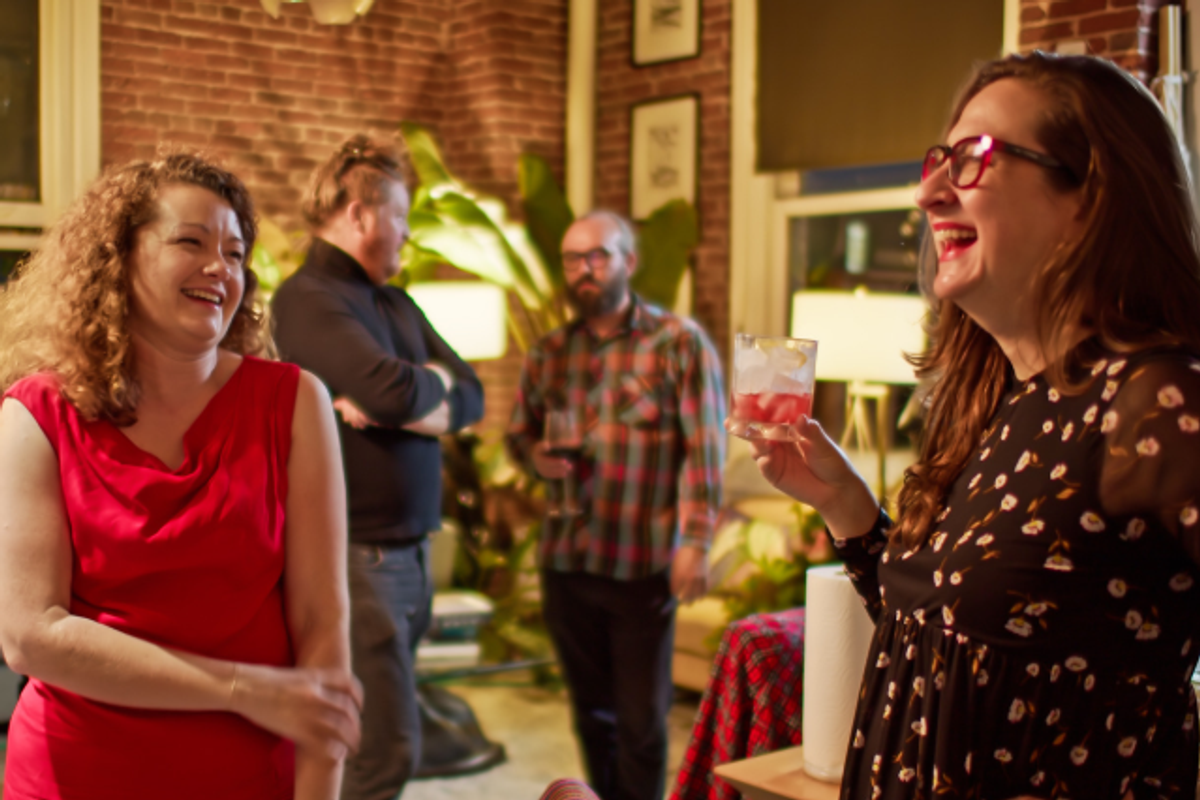A historian's grandmother never spoke about the Nazi era. Then he uncovered a document.
Greg Jenner grew up thinking his grandmother was born Catholic. That all changed on Jan. 20.
Jenner, a British historian, knew that his "Mamie" was French but never thought to investigate her past. That is, until his mother contacted him with a stunning discovery about how her mother survived the Nazi occupation.
The Holocaust Memorial in Berlin. Photo by Carsten Koall/Getty Images.
The news came as Jenner was watching Donald Trump's inauguration, which he recounts on his blog in a breathtaking essay titled "Discovering My Family's Holocaust History."
"As I winced at [Trump's] ugly oratory, and cheered myself up by retweeting droll barbs on Twitter, an email popped into my inbox from my mother. I quickly opened it, forgetting what it was she had promised to send me. Immediately it made me cry. There in black and white was a series of scanned documents listing the details of my great-grandfather’s transportation to Auschwitz."
What follows is a heart-wrenching story of love, terror, and trauma — which Jenner calls "the hardest thing I've ever written."
As Jenner's mother recently discovered while leafing through a trove of old documents, Jenner's grandmother and her sister were born to a Jewish father. When the Nazis invaded, he was rounded up and transported to a concentration camp in France and eventually was sent to Auschwitz, where he was murdered.
Jenner's great-aunt was deported to Auschwitz as well, which she miraculously survived, while his grandmother spent the war years in hiding. Some years later, she married a Catholic man and converted — burying her family's history in the process.
The main gate at Auschwitz, where Jenner's relatives were held. Photo by Scott Barbour/Getty Images.
Jenner wrote the essay with one thing in mind: Holocaust denial.
Refusing to admit that the Holocaust happened, that it wasn't as severe as conventionally portrayed, or that it didn't specifically target Jews used to be a fringe phenomenon, but recently — shockingly — it's been edging into the mainstream.
The Trump administration flirted with it when it failed to mention Jews on Holocaust Remembrance Day and when press secretary Sean Spicer claimed that Hitler didn't use chemical weapons against his "own people" (for which he recently apologized). Former London Mayor Ken Livingstone took a swing at it last year, claiming that Zionist Jews in Germany openly collaborated with Hitler, who Livingstone argued was himself a Zionist.
From left: Sean Spicer, Marine Le Pen, and Ken Livingstone. Photos by Aaron P. Bernstein/Getty Images, Thierry Chesnot/Getty Images, and Ian Gavan - WPA Pool/Getty Images.
Then there's French presidential candidate Marine Le Pen, who Jenner singles out in his essay for particular shame. Le Pen, whose political party was founded by her Holocaust-denying father Jean-Marie, sparked controversy recently by claiming that France wasn't responsible for assisting in the roundup of French Jews during the Nazi occupation.
It's a claim, Jenner says, belied by the newly uncovered evidence of the experiences of his great-aunt and her father, who were betrayed by acquaintances and held in a prison camp guarded by French police.
"My great-aunt was probably arrested and detained by her own countrymen, but she was deported to a death camp on the orders of a Nazi," he writes. "Marine Le Pen would have you forget the first part of that sentence."
Attempts to erase the ugly details of a nation's history, Jenner argues, are what allow shallow nationalism to flourish.
Children wait behind barbed wire as Soviet troops liberate the Auschwitz concentration camp. AP Photo/CAF Pap.
By whitewashing the past, unscrupulous leaders tacitly permit citizens to take pride in their country's victories and successes without having to feel guilty for the messy parts.
In France, that can mean denying responsibility for the calamity that befell families like Jenner's, pinning the blame on an outside enemy.
In the United States, it often means landmarks and apologist textbooks that glorify Confederate history and minimize the brutality of slavery. Or completely erasing the slow-moving genocide of Native Americans out of our national story.
Belief that one's country can do no wrong is a seductive position, which makes stoking that belief an all too effective political tactic.
In reality, almost all countries have done terrible things to their own citizens and residents.
The costs of denial, meanwhile, are the erasure of real people like Jenner's great-grandfather, great-aunt, and grandmother, for whom the memory of those years was so painful she never spoke of them.
"It’s only since my grandmother’s death that the rest of us have started to investigate what must have been an extraordinarily traumatic wound," he writes.
Jenner worries that once the last Holocaust survivors are gone, the memory of the horror will fade, allowing revisionist takes like Spicer's, Livingstone's, and Le Pen's to prosper.
A visitor explores Berlin's Holocaust Memorial. Photo by Sean Gallup/Getty Images.
By documenting his family's history, he hopes that in spite of demagoguery from those who bend the facts to suit their narrow political agenda, "the truth will always float to the surface."
"This week, it was my family’s truth which was corrupted by dangerous political speech. Next week it will be someone else’s. But the fallacious statements from Livingstone, Spicer, and Le Pen were successfully challenged thanks to the combined efforts of eyewitnesses, historians, and the survivors themselves, all of whom contributed over the years to help build up an understanding of what happened in those brutal years under Hitler’s reign. In the Shoah Memorial in Paris — and other institutions like it — there are documents, photos, diaries, and carefully-assembled rosters of names, dates, and places; the weight of evidence that defies denialists."
History, he admits, is complicated. But that doesn't mean there isn't fact and fiction within it.
The Holocaust and France's complicity with it is, tragically, fact.
The motto of the generation that survived the war, cruelty, and genocide of the Holocaust is "Never forget."
Photo by Sean Gallup/Getty Images.
As his grandmother's generation passes on, Jenner wants to ensure that forgetting never becomes easier.




 Curtains can help make a space feel homey and hide bad windows and trim.
Curtains can help make a space feel homey and hide bad windows and trim. Clean and tidy sets a mood.
Clean and tidy sets a mood. Lighting makes a big difference in how your home feels.
Lighting makes a big difference in how your home feels.
 A man being licked by a golden retreiver.
A man being licked by a golden retreiver.  A dog's tongue close-up.
A dog's tongue close-up.  A golden retreiver getting their teeth brushed.
A golden retreiver getting their teeth brushed. 
 Cathedral-like libraries like the George Peabody Library in Baltimore, Maryland are popular places for creative work.By Matthew Petroff/
Cathedral-like libraries like the George Peabody Library in Baltimore, Maryland are popular places for creative work.By Matthew Petroff/ The Sterling Memorial Library at YaleBy Nick Allen/
The Sterling Memorial Library at YaleBy Nick Allen/
 A woman making eye contact with a man she is speaking to.via
A woman making eye contact with a man she is speaking to.via  A man in a suit with questions.via
A man in a suit with questions.via